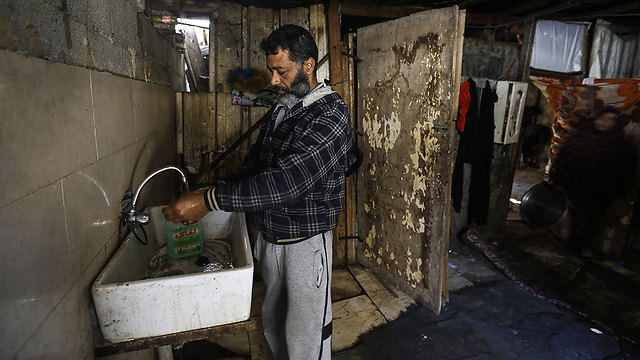
Gaza’s stench is penetrating Israel
Op-ed: We may not care about infant mortality in Gaza, but the seawater contamination in the strip is going to reach Israel’s shores and cause irreversible damage, including a possible shortage of desalinated water. By failing to deal with this, Israel is shooting itself in the foot.
The smell of sewage is also the smell of death. According to United Nations reports, which were quoted in the state comptroller’s report in May, the first reason for infant mortality in Gaza is the poor quality of water. Twenty-six percent of diseases in the strip, and most child diseases, are the result of the contaminated wastewater penetrating the wells, the shores and the streams—not just in Gaza, but also in the nearby Israeli beaches.
It all starts with electricity : The five wastewater treatment stations in Gaza, which are extremely heavy consumers of electricity, are dysfunctional. There is not enough electricity. Officials in Ramallah claim that they have no money and that Hamas should pay its share in electricity. After all, Hamas charges NIS 100 million in tax, including from the fuels that reach the Strip. Israel is saying: Am I supposed to interfere in the relations between Hamas and the Palestinian Authority? No money—no electricity.

Every month, Israel transfers to the PA tax funds it has collected for its economic activities in Israel’s ports and territories. From these funds, it deducts some NIS 550 million—the cost of electricity that the Israel Electric Corporation supplies to the strip every month.
About two months ago, the PA announced that due to its economic situation, it was deducting NIS 40 million of the cost of electricity to the strip. Israel is refusing to fund it, and the Defense Ministry has decided to reduce the electricity supply to the strip by 15 percent, accordingly. In the meantime, Israel has only reduced the voltage. In any event, Gaza receives only four hours of non-stop electricity a day, followed by long and irregular power outages.
The wastewater treatment stations are dysfunctional, the large and modern wastewater treatment facility built by the World Bank in the northern strip in 2013 has yet to be activated because there is no electricity, and Defense Minister Avigdor Lieberman is telling Hamas: Stop digging tunnels and you’ll get everything—electricity, a port, etc. That makes sense. But it’s exactly how Israel’s governments have been brainwashing us over the years with axioms aimed at preserving the status quo and serving political needs.
The recent state comptroller’s report, which dealt with environmental nuisances on both sides of the border, revealed that the Rutenberg Power Station in Ashkelon had sustained damage due to the contamination of organic wastewater. Even worse, the facility on the Ashkelon coast—which supplies 20 percent of the desalinated water to the State of Israel—was shut down for more than 24 hours due to an extreme organic contamination in the seawater. The damage amounted to tens of millions of shekels.
The Mediterranean Sea flows from southwest to northeast. There is no doubt, therefore, that the seawater contamination in the strip is going to reach Israel’s shores. Infant mortality in Gaza may not trouble anyone here, but heavy damages to Israel—including a possible desalinated water shortage—are definitely the state’s business. And if Israel fails to deal with this, it is shooting itself in the foot.
There are those in Israel who believe that a shortage of budgets and infrastructures will encourage the Gaza citizen to rise up against Hamas. Until that happens, however, we are causing ourselves irreversible damage. According to the state comptroller, “The untreated wastewater leads to a contamination of the seawater, the streams and the ground water in the Israeli areas bordering the Gaza Strip. There are also security and health risks for Israel in case diseases are spread due to water contaminations in the strip.” I doubt anyone at the Defense Ministry even read this paragraph.
If there is no electricity in July and August, who will the strip’s population direct its anger at—Hamas, the PA or Israel? The answer is clear. And how many millions more will Israel have to pay to deal with the consequences of the seawater contamination, which will only increase? This is the defense minister’s test: Slogans or “Realpolitik.”










